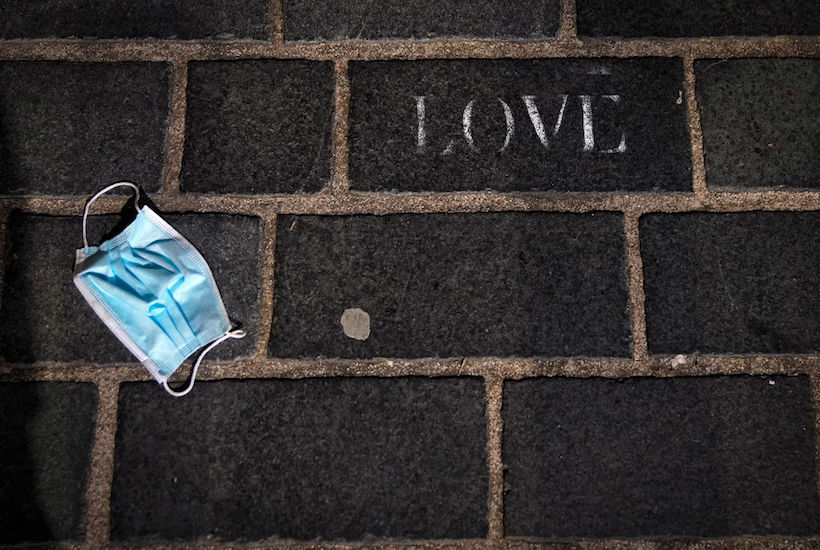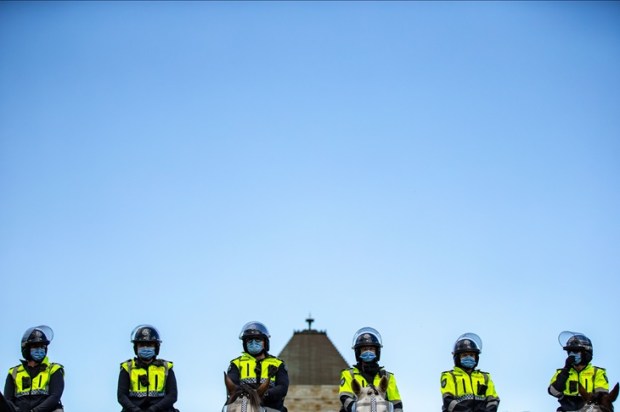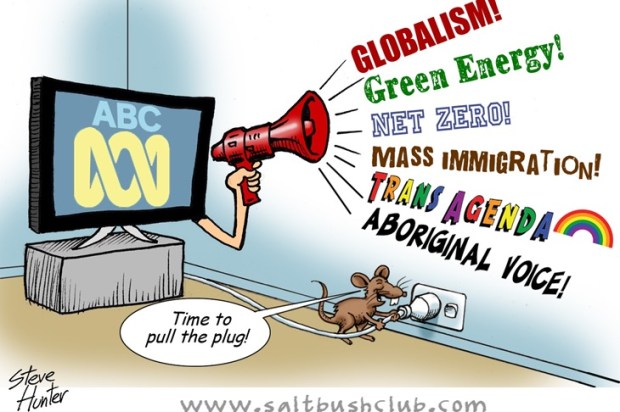Social stigma is a damaging phenomenon. It occurs when people are associated with negatively viewed events, beliefs, and social phenomena that lead the community to infer harmful stereotypes and assumptions about a specific population.
Unfortunately, stigma is a social construct that takes many forms and has existed, essentially, from a new civilization’s dawning and the first organized societies interacting with one another.
This all transitions into how people treat each other regarding health issues and their decision on behalf of their health. Amid COVID-19, my wife and I have experienced outward aversion from family members and people we considered friends.
Much of this has weighed on my mind for many months. Allow me to explain by starting at the beginning. My wife — a beautiful girl of German and Lebanese descent — woke me up one late morning before noon crying earlier last month. After a long night of work, I was getting sleep, which forced me to fall asleep in that morning’s very early hours.
Before I fell asleep for a short and restless four-hour snooze, I finished off a bottle of really cheap—but very smooth—vodka from Poland. These times are hard, and in my professional capacity, it’s one devastating setback after another. Who can blame me for boozing in my own home? I was still employed, running my newsrooms and content programs from my laptop.
However, the pandemic escalated the amount of breaking news while highlighting the need, ironically, for field reporting and good old scoop-houndery. The night before was a hectic news cycle, and, easily, I worked through much of the night, considering the vast expansion of content and the ferocity of the pandemic-era news cycle.
It was a typical morning, but things quickly changed when my wife stormed into our bedroom with a display of emotion that I couldn’t even begin to explain at that moment.
She pushed me awake. Out of my hung-over daze, I try to gather my words in an attempt to ask her what was the matter.
My wife asked: “Did you read my text?”
“No, I’ve been sleeping,” I replied, quite groggy and dizzy. “What’s wrong with you?”
“The test came back positive. I have the virus,” she lamented.
I knew what she was talking about. A few days earlier, her employer — a local nonprofit organization that offers child care and other social services — sent her home early from work one day after demonstrating various symptoms that emulate those of the COVID-19 virus.
Following my advice and our primary care physician, she got tested. Working with children, my wife is considered an essential employee in our home town — a small suburban mountain town.
She needs to maintain her health to support her employer’s essential operations during the pandemic. The positive test, though, was a devastating event for my wife.
Immediately, she began freaking out, blaming herself. It didn’t help that her coworkers and supervisors started shaming her for being exposed to COVID-19 and getting sick.
They cursed at her. They treated her as if she was a second class citizen—an outsider. Someone who failed, even though this was the furthest thing from the truth. She was stigmatized for catching the virus. That was unacceptable, and it still angers me to this day.
Regardless of my personal feelings, I recollect this brief anecdote to refer to the ongoing epidemic of COVID-19 stigmatization and outright discrimination against the sick and at-risk populations.
Typically, as a journalist, I cover drug harm reduction, and I discuss public health ethics.
For instance, The Spectator Australia recently published a column where I discuss some of the more fascist-leaning tendencies of public health practice while reminding readers and practitioners alike to keep in mind the balance of fundamental human rights and the need to protect the public’s health.
However, the horrid things I’ve heard about the COVID-19 stigma inspired me to do some digging and more substantial research.
Earlier this year, the leaders for the International Committee of the Red Cross, the International Federation of the Red Cross and the Red Crescent Societies, Médecins du Monde, and several other organizations signed a declaration callin for an end to violence against healthcare workers and essential workers across the world.
When you transfer these concerns to patients’ social treatment by community members, we see a similar disgrace and anger built on fear and ignorance. For my wife’s case, the anger and frustration levied against her by friends, family, and colleagues isn’t unique either. But, it truly is an example of how people respond to the news of positive COVID-19 tests.
In 2016, The Lancet medical journal published an editorial covering the stigmatization of people who struggle with mental illness. These people experience “shame, ostracism, and [marginalization],” the editors note, and the harm done by the external individuals who chastise them disrupts and further complicates recovery and treatment.
Infectious diseases like COVID-19 follow similar frameworks of stigma and marginalization. As a result, the feeling of shame and self-doubt associated with a COVID-19 positive test builds through the psychological devastation that patients might have amid all of this.
Amy Morin, the editor-in-chief of VeryWell Mind and a world-renowned licensed clinical social worker and a psychotherapist, wrote a column in November that the pandemic has spawned a case of victim-blaming, as it relates to the COVID-19 patient perhaps feeling responsible for being sick and not doing more to maintain their health.
Victim-blaming is typically used to describe when the victim of a crime or any wrongful act is held responsible for such an action. However, in the actual field of victimology, victim-blaming can apply to the degree of guilt and whether some victims bear no responsibility for their victimization. In contrast, others are based on their behaviours or actions.
But, victim-blaming could easily be applied to the issue of COVID-19 infection. This is especially the case for people being blamed for contracting and spreading the virus due to being in a specific population group. Discrimination against Asians and Asian-Americans has increased, according to a study that was published in the academic journal Stigma and Health in November of 2020.
Suyeon Lee and Sara F. Waters of Washington State University, Vancouver, found that the rise of racially discriminatory behaviour against people of Asian descent in the U.S. has been surging during the extent of the ongoing COVID-19 pandemic.
“When COVID hit, we were quickly hearing anecdotes on social media and in traditional media about Asian Americans experiencing a variety of racial abuse,” said Waters in a news report published by Science Daily on November 2. During the study, 400 people responded, with at least 30 percent saying that they experienced discrimination since the pandemic initiated, and 40 percent experienced impacts of stigma on their health. Given the elevated racial discrimination, the individuals experiencing the stigma emulate depressive and physical symptoms, including sleeping troubles and anxiety.
For most individuals who’ve gotten sick, the stigma against them is often more generalized but as equally as devastating as whether a particular social group was the central target of specific hatred. Many people, regardless of socioeconomic background, have become social pariahs because their friends and family members are afraid of catching the virus. They’re responsible for catching and spreading the COVID-19 virus despite many not knowing when or where they were exposed.
This was the case for my wife, as I mentioned, and her coworkers that were additionally exposed to the novel coronavirus and chose to enter self-isolation or quarantine. One of my wife’s coworkers — a firm adherent to Christianity and a college student at a nearby university — was exposed to someone with the virus, for instance. Being that this woman is in touch with her Christian beliefs, she interacted with the individual or individuals at an in-person meeting of a Bible study group that she attended regularly.
By attending this session of her Bible study, she was exposed to the point that she was later found to have tested positive for the virus. This was before my wife’s diagnosis.
I recall vividly how distraught this young woman was when she was diagnosed with COVID-19. However, the stress and anger came from an entente of criticism from her coworkers and managers who mocked and laughed at her for attending her Bible study, practicing her faith openly, and still getting sick. The people who mocked this girl were the same people who mocked my wife a week later upon the news of her diagnosis.
The point is that people who are afraid of the virus or are bitter about it in some capacity took out their frustrations on this girl, my wife, and a few other of my wife’s coworkers and close friends. People who thought they were friends to the individual ignored them, and even worse, criticized them and ultimately insinuated that they contribute to the deaths of the thousands of people who die from this virus every day.
For my wife, this happened between two of her closest friends over a conversation on the social media mobile phone app Snapchat. Like much of the capitalist world, the United States worships Black Friday and the weekend of hyper-consumerism following the national Thanksgiving celebration. My wife and I are no different from the others who brave the cold and the pandemic-era restrictions to score insane deals on TVs and phones.
We ventured this past Black Friday to our local big box store to purchase some treasures and enjoy some much needed retail therapy and exposure to outside life. Both of us were cleared by our doctor from having symptoms and were told that we are no longer a significant threat to people or through or exposure. So, in English, we recovered quickly, and we managed to receive the endorsement of a highly respected medical professional to rejoin daily life in some modified capacity after negative tests.
To spare this anecdote from going on further, the short version of the story is that my wife “snapped” her two friends a funny photo of us out shopping on the night of Black Friday, and they both responded with aggression and disrespect. They both called her a liar, shaming her for going out into public and spreading her germs and contributing to the lethal spread of the virus. She became angry and began crying in the store because of these jabs. I immediately knew that these two individuals she considered close friends were stigmatizing her, even when she experienced a full recovery from the virus.
When they are afraid, misinformed, or both, this boils down that people need a common enemy or “someone to blame” for the state of affairs in life. In contrast, my wife’s recovery story was a success.
Notably, people are afraid to seek the medical attention they need if they have symptoms of the novel coronavirus, out of fear of isolation, rejection by those in their communities, and the loss of income from work, among other factors.
It’s a sentiment among many, especially among essential workers like my wife or healthcare professionals or members of the services industries, that receiving the COVID-19 virus will be a death sentence for someone’s social life, personally and professionally. Given the stigma, there’s no deterrence of risky behaviour, but more deterrence away from disclosure to public health authorities who are tracking the virus.
Julia Marcus — a renowned infectious disease epidemiologist, an associate professor at Harvard Medical School, and an academic I admire and respect — has commented on how stigma related to the virus is “toxic” and upends public health’s overall goals to protect individual autonomy and the bioethical respect for personal responsibility.
“People become afraid to share their exposures, symptoms, and test results with each other, with contact tracers,” Marcus wrote in a Twitter thread a few weeks ago. “They avoid getting tested at all. Stigma makes public health efforts break down.”
She added that “empathy is an antidote to stigma.” That couldn’t be more true. Stigma and marginalization against people who are considered “plague spreaders” derives from various more complicated factors, including personal perception, feelings of fear, and whether they perceive public health policy interventions as positive or negative.
Regardless, the moral of the story is that stigma doesn’t work. For the pandemic, we can rest assured that countries are beginning the crucial processes of approving COVID-19 vaccinations and treatments and that we can begin fully recovering from this extraordinary crisis.
In the meantime, don’t be a dick.
Michael McGrady is a contributor to The Spectator Australia, based in the United States. He covers public health and harm reduction policy related to drugs and disease.
Got something to add? Join the discussion and comment below.
Get 10 issues for just $10
Subscribe to The Spectator Australia today for the next 10 magazine issues, plus full online access, for just $10.


























Comments
Don't miss out
Join the conversation with other Spectator Australia readers. Subscribe to leave a comment.
SUBSCRIBEAlready a subscriber? Log in